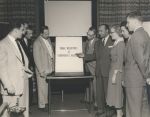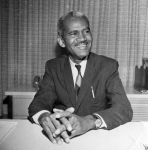Blogs
Collection Spotlight: Ramon S. Scruggs, Sr. Papers
- Affirmative action
- African American businesspeople
- African Americans--Michigan--Detroit--History--20th century
- Civil rights--America
- Detroit Urban League
- Humphrey, Hubert H., 1911-1978
- NAACP
- National Urban League
- Nixon, Richard M. (Richard Milhous), 1913-1994
- Romney, George
- Urban Affairs
- Young, Whitney M.
Best known as the first African American member of management at both the Michigan Bell Telephone Company and AT&T, Ramon S. Scruggs, Sr. served as an influential civil rights figure in the American business community from the 1940s until his passing in 1984. What separated Scruggs from many other civil rights figures was his focus on improving racial equality through integrating African Americans into positions of management within large corporations. The Ramon S. Scruggs Sr. Papers, recently opened to the public at the Walter P. Reuther Library, chronicle the subject’s numerous accomplishments. read more »
Ernest Dillard Passing
The Reuther notes with sadness the passing of Ernest C. Dillard, who passed away at 101 years of age this week.
Ernest C. Dillard, Sr. was born in Montgomery, Alabama, on January 24, 1915, though the bulk of his labor and civil rights activities were in Detroit, Michigan. Dillard was an active member of United Auto Workers Local 15 and was the first African-American elected to a succession of UAW leadership posts. He retired in 1980 as assistant director of the UAW Community Action Program. read more »
HistoryPin: Tour the Detroit Sit-Down Strikes of 1937
The Reuther Library is pleased to announce its partnership with HistoryPin. For the uninitiated, HistoryPin is a popular, interactive social media platform that uses geotagging to link historical photographs to modern mapping systems. Partnering institutions and individuals--currently thousands across the globe-- “pin” still images, audio resources, or moving images to their subject’s original location. These pins can be grouped together in a tour or collection, each allowing for the individual user to explore historical topics or locations. The platform is widely available through a website or via mobile device applications. read more »
Announcement: Reuther Library Reading Room Renovation Completed
In January 2014 the Reuther received a generous donation, which could be used for any purpose as it was not dedicated to a specific account or project. After careful consideration of how to use the funds, a decision was made to update the Reading Room, the first renovation to the room since the building’s construction in 1975. The donation allowed us to purchase new furniture, to install new carpeting, to repaint the room, and to refurbish the Reading Room's reference desk. read more »




